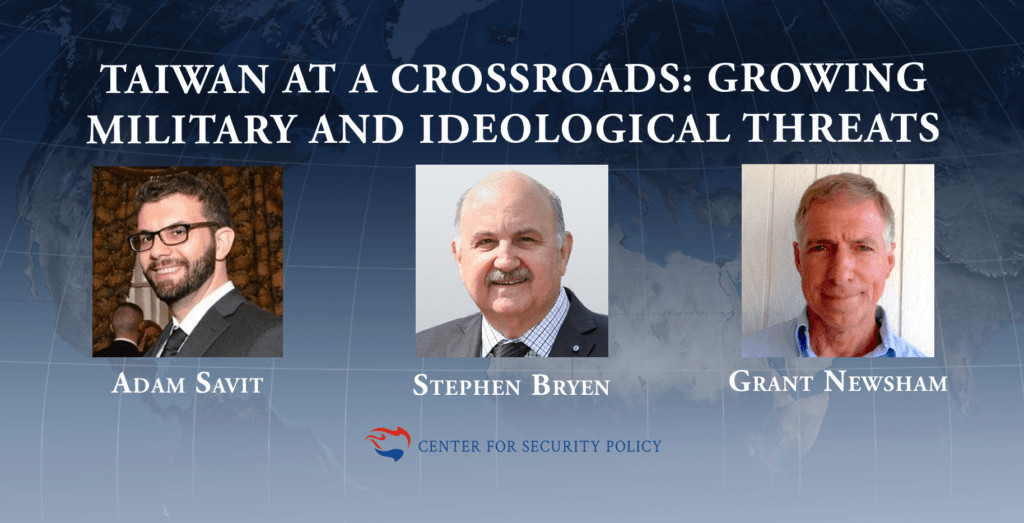Webinar: Taiwan at a Crossroads: Growing Military and Ideological Threats

President Donald Trump brought unprecedented economic and political pressure to bear on the Chinese Communist regime over the last 4 years. That pressure has already begun to dissipate under a Biden foreign policy. One of the first victims of this power vacuum, as an island democracy only 110 miles off China’s coast, is sure to be Taiwan.
On February 17, the Center for Security Policy convened a webinar entitled “Taiwan at a Crossroads: Growing Military and Ideological Threats,” featuring two seasoned experts in the field who have contributed thoughtful research on Taiwan’s strategic situation to the Center’s newly minted China Program: Stephen Bryen, a leading expert in security strategy and technology with 50 years of experience in government and industry, including senior positions in the Department of Defense and on Capitol Hill, and Grant Newsham, a retired U.S. Marine Colonel with extensive experience in multiple military and diplomatic roles in Japan and Taiwan, and currently a Research Fellow at the Japan Forum for Strategic Studies. Both are Senior Fellows with the Center for Security Policy. The panel was moderated by China Program coordinator Adam Savit.
Stephen Bryen expanded on his report for the Center, which called on the Biden administration and their Taiwanese and Japanese counterparts to create a Joint Military Command to fully coordinate a military response to Chinese invasion threats. He emphasized a stark decision between continuing Trump policies or returning to Obama policies that effectively “squeezed” Taiwan. “The Chinese clampdown on pro-democracy interests in Hong Kong has the made the Taiwanese people afraid that they will meet the same fate,” Bryen also noted.
When asked about an administration-proposed Pentagon China Task force, he opined that “half Pentagon civilians and half Pentagon military offers some hope that we’ll have something worthwhile at the end,” but cautioned that he “doesn’t have great expectations” because it has to coordinate with the State Department and other agencies that may “water down” and “neutralize” the mission.
Meanwhile, Grant Newsham began with a comprehensive look at the geostrategic situation in East Asia, including the “First Island Chain” concept which places Taiwan as the geographical lynchpin of the Chinese strategy to break the ability of the U.S. and regional powers to successfully curb China’s expansion.
He also explored the moral and ideological fallout that would follow a potential Chinese conquest of Taiwan, including a country-by-country rating from Blue (resilient) to Red (under Chinese domination) regarding their future in such an “Asia Turning Red” scenario. He identified Japan as possibly the most resilient having been scared into action from watching Taiwan fall. He also expressed hope that the so-called “Quad” comprising the U.S., Japan, India and Australia might take more serious measures and a more active role in this scenario.
Other topics included Taiwan’s ability to import military equipment, Chinese espionage and strategic tech industries at risk.
Please watch the embedded video to view the full program.
The Center holds weekly webinars on Wednesdays at 1pm ET. Every fourth webinar going forward will cover a China topic. Please click here for a schedule, and for archives of past webinars.
- Nearly half say coronavirus is man-made; 29% say it was intentionally released - February 17, 2022
- Americans back total boycott of Beijing Olympics under certain conditions - December 13, 2021
- Beijing pushes limits of authoritarian reach with latest celebrity “disappearance” - November 19, 2021
